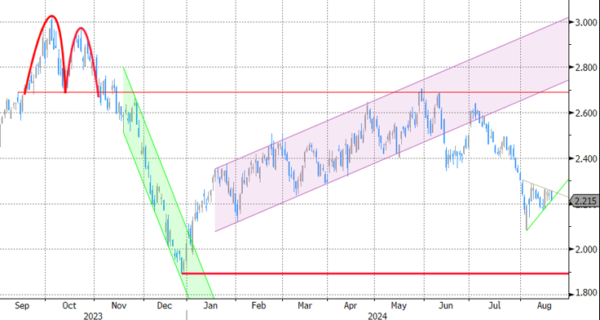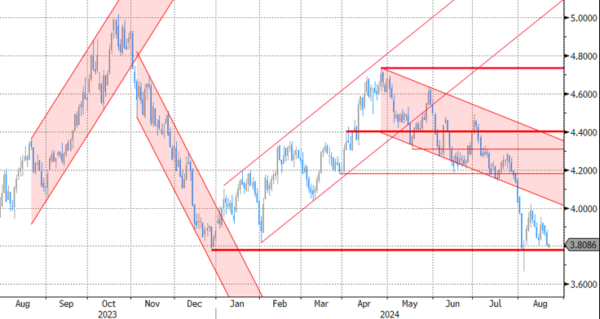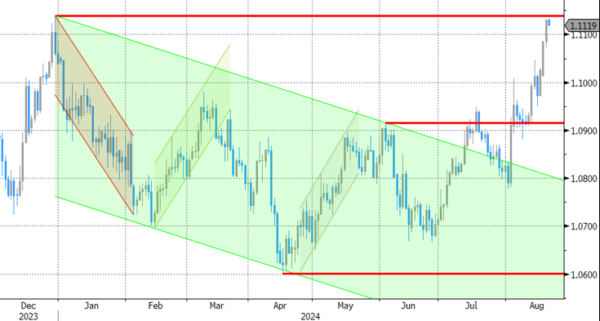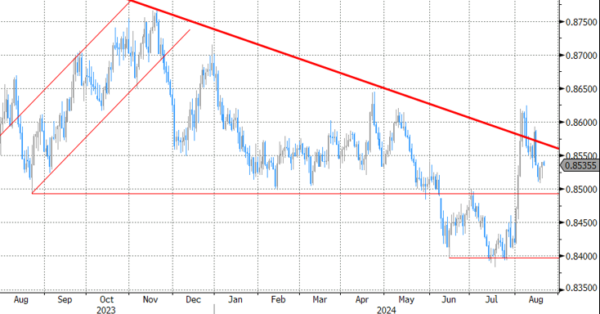Markets
The recent comeback momentum on US stock markets stalled yesterday with main US benchmarks suffering minor losses (-0.25%) following an astonishing rally over the past two weeks. Other directional trades continued. US Treasuries outperformed German Bunds with daily changes on the US curve ranging between -8.2 bps (2-yr) and -6.2 bps (30-yr) compared with -3.3 bps (5-yr) to -2.7 bps (30-yr) for Germany. US yields started slipping again as US traders joined yesterday’s actions. Fed Bowman said that should the incoming data continue to show that inflation is moving sustainably toward our 2% goal, it will become appropriate to gradually lower the federal funds rate to prevent monetary policy from becoming overly restrictive. The onus of several Fed comments is on gradual contrary to stealth easing discounted by US money markets for this year and next. In the run-up to this afternoon’s BLS payrolls revision, tomorrow’s PMI’s and Friday’s Powell speech in Jackson Hole, interest rate markets are clearly not (yet) backing down from their aggressive Fed easing bets. The US 2-yr yield closed back below 4% and seems drifting back to test the 3.85% support area. Failure to move south on softer data/dovish signals this week or early September (ISM’s & Payrolls) would be a strong signal that sufficient dovishness is discounted by now. The US 10-yr yield is already testing important support at 3.8%. The dollar continues suffering from the interest rate loss. The trade-weighted greenback closed at 101.44 yesterday from a start at 101.88. Key support arrives at 100.62 (Dec23 low), 99.58 (2023 low) and 98.98 (62% retracement on 2021/2022 DXY rally). Similar resistance in EUR/USD (close 1.1130) stands at 1.1139/1.1274/1.1276.
The US Bureau of Labour Statistics today publishes its preliminary annual benchmark revision (using Quarterly Census of Employment and Wages data). The June QCEW suggested that US job growth in the year through March was likely less robust than indicated. Ballpark figures point at a downward revision of about 60k/month on average. Today’s payrolls revision had over the past months been flagged as a potential gamechanger pushing markets and the Fed away from “higher for longer” into more outspoken rate cuts. Since the early August repositioning in US money markets, the BLS update likely lost market impact. From being a potential game changer to more of a confirmation. Nevertheless, any substantial (>50k/month) downward revision won’t go unnoticed and could tip markets more in the direction of a 50 bps rate cut lift-off.
News & Views
PAP newswire reports that National Bank of Poland governor Glapinski indicated that he no longer can rule out a discussion on a monetary policy adjustment before 2026. Last month, he still advocated that view due to reigning uncertainty about the inflation outlook. According to Glapinski’s current assessment, decisions will depend on wage growth, consumption, energy prices and the economic situation of Poland’s trading partners. In this respect, the NBP governor indicated that the risk of higher inflation in Europe and the US was slightly disappearing and that rate cut expectations have increased. The Polish economy has grown more than expected in Q2 (1.5% Q/Q and 3.2% Y/Y) according to preliminary data released last week, Glapinski’s says that it’s not sure this trend will continue. Consumption will probably slow next year due to fading wage growth. This will make the international context a more important factor for Polish growth. Polish inflation reaccelerated in July to 1.5% M/M and 4.2% Y/Y (from 2.6% in June) as the government raised the cap on energy prices. The PLN 2-y swap rate declined from 5.10% to 4.94%.The EUR/PLN cross rate jumped from the 4.265 area to close near 4.276.
Canadian inflation (published yesterday) rose by 0.4% M/M in July causing the Y/Y figure to decelerate further from 2.7% to 2.5%, the slowest pace since March 2021. The monthly details were a bit mixed with goods prices rising a modest 0.2% M/M (0.3% Y/Y), but services reaccelerating 0.7% M/M (slowing to 4.4% Y/Y from 4.8%). Energy prices rose 1.6% M/M. Closely watched core inflation measures (core median 2.4% from 2.6% Y/Y and core trimmed mean 2.7% from 2.8% Y/Y) remain on a downward trajectory. The data are seen as a nihil obstat for the Bank of Canada to further reduce its policy rate (currently 4.5%) when it will meet next on September 4 (25 bps reduction fully discounted). At its July policy meeting, the BoC indicated a growing sensitivity for the risks to growth/excess supply in the economy.
Graphs
GE 10y yield
The ECB cut policy rates by 25 bps in June. Stubborn inflation (core, services) make follow-up moves less evident. Markets nevertheless price in two to three more cuts for 2024 as disappointing US and unconvincing EMU activity data rolled in, dragging the long end of the curve down. The move accelerated during the early August market meltdown.

US 10y yield
The Fed in its July meeting paved the way for a first cut in September. It turned attentive to risks to the both sides of its dual mandate as the economy is continuing to move better in to balance. Money markets tend to err in favour of a 50 bps lift-off. The pivot weakened the technical picture in US yields with another batch of weak eco data pushing the 10-yr sub 4%.

EUR/USD
EUR/USD moved above the 1.09 resistance area as the dollar lost interest rate support at stealth pace. US recession risks and bets on fast and large (50 bps) rate cuts trumped traditional safe haven flows into USD. EUR/USD 1.1139 (Dec 2023 high) and 1.1276 (2023 top) serve as next technical references.

EUR/GBP
The BoE delivered a hawkish cut in August. Policy restrictiveness will be further unwound gradually 0on a pace determined by a broad range of data. The strategy similar to the ECB’s balances out EUR/GBP in a monetary perspective. Risk-off proved a more important driver of GBP recently, triggering a return from 0.84 towards 0.86.










